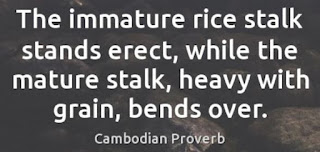There are only a few ways to become humble.
Natural Aging. Once you grow old, you see things on a wider canvas. Embattled, you become wiser and humble.
Enlightenment. Technically, like Buddha, you can attain enlightenment at young age, if you persevere enough. But that’s an outlier. One in a billion.
Naturally Gifted. If you are in a different league altogether, you might be able to afford humility. A class act like Roger Federer or like a well informed teacher with his young students where a case of threat is never perceived.

However, for most of us, there is one more way to become humble. Humiliation.
Interestingly, while humility has a noble connotation, humiliation sounds almost repulsive. So much so that, a humiliated leader is even considered a failed one! Yet there is a correlation beyond the Latin root they share (‘humilis’ meaning lowly). Most of us are humbled, put in our places, by humiliating experiences. But here again, two possibilities. Either, you fail overcoming the impact and fade out, humbled. Or you bounce back stronger. But those that bounce back, end up being essentially less humble (success having boosted their morale). Besides, there is no shame in success, pride and ego, justifiably won.
So, does Humility really stand a chance with Leadership?
Putting it all together, with age, most of us become humble. But during our prime, those who think more ‘for’ themselves, overcome challenges better and become successful leaders. Unfortunately, Success and Leadership does not favor Humility. But the sweet irony remains. In spite of all odds, if a leader still has it, it makes him or her, truly great. If you do meet one, become a disciple.
But you ask, how has Humility survived at all?
Perhaps, Social Darwinism has a pointer. Peter Kroptkn (“Mutual Aid: A factor for Evolution” ) suggests ‘fittest can also mean the community or collective made of those best at working together and not individual’.


Comments
Post a Comment